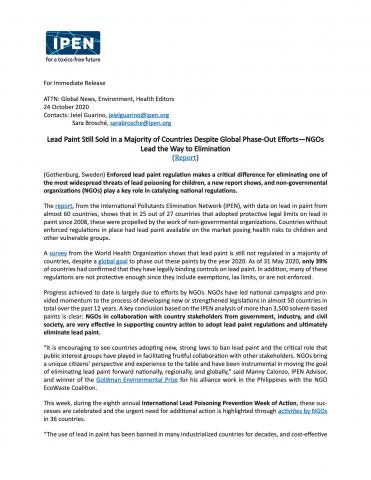Lead Paint Still Sold in a Majority of Countries Despite Global Phase-Out Efforts—NGOs Lead the Way to Elimination

For Immediate Release
ATTN: Global News, Environment, Health Editors
24 October 2020
Contacts: Jeiel Guarino, jeielguarino@ipen.org, Sara Brosché, sarabrosche@ipen.org
(Gothenburg, Sweden) Enforced lead paint regulation makes a critical difference for eliminating one of the most widespread threats of lead poisoning for children, a new report shows, and non-governmental organizations (NGOs) play a key role in catalyzing national regulations.
The report, from the International Pollutants Elimination Network (IPEN), with data on lead in paint from almost 60 countries, shows that in 25 out of 27 countries that adopted protective legal limits on lead in paint since 2008, these were propelled by the work of non-governmental organizations. Countries without enforced regulations in place had lead paint available on the market posing health risks to children and other vulnerable groups.
A survey from the World Health Organization shows that lead paint is still not regulated in a majority of countries, despite a global goal to phase out these paints by the year 2020. As of 31 May 2020, only 39% of countries had confirmed that they have legally binding controls on lead paint. In addition, many of these regulations are not protective enough since they include exemptions, lax limits, or are not enforced.
Progress achieved to date is largely due to efforts by NGOs. NGOs have led national campaigns and provided momentum to the process of developing new or strengthened legislations in almost 50 countries in total over the past 12 years. A key conclusion based on the IPEN analysis of more than 3,500 solvent-based paints is clear: NGOs in collaboration with country stakeholders from government, industry, and civil society, are very effective in supporting country action to adopt lead paint regulations and ultimately eliminate lead paint.
“It is encouraging to see countries adopting new, strong laws to ban lead paint and the critical role that public interest groups have played in facilitating fruitful collaboration with other stakeholders. NGOs bring a unique citizens’ perspective and experience to the table and have been instrumental in moving the goal of eliminating lead paint forward nationally, regionally, and globally,” said Manny Calonzo, IPEN Advisor, and winner of the Goldman Environmental Prize for his alliance work in the Philippines with the NGO EcoWaste Coalition.
This week, during the eighth annual International Lead Poisoning Prevention Week of Action, these successes are celebrated and the urgent need for additional action is highlighted through activities by NGOs in 36 countries.
“The use of lead in paint has been banned in many industrialized countries for decades, and cost-effective alternatives to leaded paint ingredients are widely available. Yet children throughout the developing world continue to be exposed to lifelong and irreversible damage due to exposure to lead in paint. This situation is completely preventable. Lead paint needs to be eliminated in all countries,” said Sara Brosché, Manager, IPEN Global Lead Paint Elimination Campaign.
“Lead paint is one of the most widespread sources of childhood lead exposure and can cause permanent and irreversible brain damage in children’s developing brains. Lead paint can cause reduced intelligence quotient (IQ) and attention span, impaired learning ability, and increased risk of behavioral problems. There is no known level of lead exposure without harmful effects and we therefore need concerted efforts to prohibit lead in all types of paint,” said Jeiel Guarino, IPEN Global Lead Paint Elimination Campaigner.
In order to accelerate efforts to eliminate lead paint globally within the next five years, the report calls for:
International agencies to continue providing guidance and information to individual governments seeking assistance in establishing regulatory controls on lead in paint.
National governments to take steps now to begin developing lead paint regulations in consultation with national stakeholders.
Paint manufacturers, paint industry trade associations, and paint ingredient vendors to take voluntary action immediately to eliminate lead from all paints.
Donors to make significant new resources available for global lead paint elimination, with a focus on strategic country actions.
###
IPEN (International Pollutants Elimination Network), the global environmental health network of over 600 organizations in 124 countries, works to eliminate and reduce the most hazardous substances to forge a toxics-free future.
| Attachment | Size |
|---|---|
| 139.61 KB |
